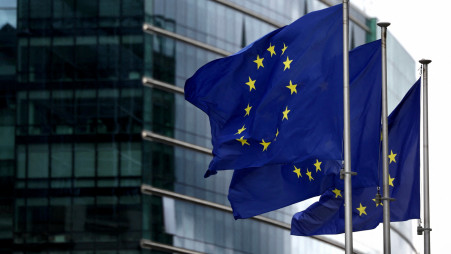
Highlighting the potential of Bangladesh, they called on the government for sustainable policies and transparent energy supply mechanisms to increase foreign direct investment.
FILE PHOTO: European flags fly outside the European Commission headquarters in Brussels, Belgium September 20, 2023. REUTERS/Yves Herman/File Photo
“>

FILE PHOTO: European flags fly outside the European Commission headquarters in Brussels, Belgium September 20, 2023. REUTERS/Yves Herman/File Photo
European investors in Bangladesh raised concerns over the ongoing dollar shortage and energy security challenges in the country to run their businesses.
They also addressed high inflation and the devaluation of taka as short-term challenges for businesses while speaking at a seminar titled “Unlocking Trade and Investment for European Companies in Bangladesh” held on Wednesday in a city hotel.
The seminar was jointly organised by the European Union and the Dhaka Chamber of Commerce and Industries (DCCI).
In the panel discussion, foreign investors addressed frequent changes in tax and VAT laws, lack of infrastructure and bureaucratic problems in getting business licences as issues creating bottlenecks for future investment.
Highlighting the potential of Bangladesh, they called on the government for sustainable policies and transparent energy supply mechanisms to increase foreign direct investment.
Acknowledging the challenges that foreign investors raised, Commerce Minister Tipu Munshi said, “We have problems and we will work together to overcome them.”
Ambassador of the European Union (EU) to Bangladesh Charles Whiteley said, “Bangladesh has the option to accede to GSP+ which is the next most generous GSP programme after the Everything but Arms (EBA) trade regime.”
“In this context, aligning labour laws with international standards will be an essential element for the European Parliament and the Commission in considering Bangladesh’s application for market access under this trade regime.”
“The implementation of the national action plan on the labour sector, which Bangladesh agreed with the EU, will be the key deciding factor for GSP+.”
“We are closely following the ongoing amendment of the Bangladesh Labour Act. We hope that the amendment will be done with full transparency and in consultation with tripartite stakeholders and with technical assistance from the ILO,” he said.
Barrister Md Sameer Sattar, president of the DCCI, said, “Bangladesh needs to sustain the export market in its traditional and major destinations including the EU. We would like to acknowledge the decision of GSP facility extension to Bangladesh by the EU till 2029 considering the need for smooth economic transition.”
When talking about the challenges EU investors are facing in Bangladesh, Iqbal Chowdhury, CEO of Lafarge Holcim Bangladesh, said, “When the group allows some investments and we fail to execute on time, it becomes a bottleneck for our future investments.”
“The next challenge is the sustainability of the policy. Our tax, and VAT laws change every year. This is another big challenge for me, for any foreign investor.”
“Foreign investors in the country have to play an active role as a brand ambassador. If it’s possible, you will see lots of FDIs coming. So give us that great experience,” he said.
Petromax LPG CEO Massih Niazi shared his business experience in Bangladesh, highlighting two types of challenges.
First, he noted that many importing companies are facing dollar shortages and difficulties opening letters of credit. This short-term situation is also having some side effects.
Second, Niazi explained that LPG companies cannot pass on the cost of taka devaluation to consumers. “As a result, the company is conceding a significant loss right now,” he said.
“Currently, the country is facing some short-term challenges, such as the dollar shortage, high inflation, and taka devaluation. However, there are three structural challenges that investors should be aware of.”
“First, Bangladesh faces significant infrastructure challenges. While there have been some improvements, such as the metro in Dhaka and the upcoming inauguration of the new airport terminal by the Prime Minister in October, more needs to be done to improve transportation and power supply systems. This could pose some difficulties for entrepreneurs operating in the country, as it would require significant road improvements and reliable power and transportation systems.”
“Second, the regulatory landscape in Bangladesh can be challenging for entrepreneurs due to the bureaucratic system.”
Nuria Lopez, managing director of Zalo Knitting, has been in the garment business in Bangladesh since 1997. She shared her experience, saying that foreign investors who are already in Bangladesh are always reinvesting.
“If the investors who are here are reinvesting, why don’t new ones come? It is probably because of the country’s branding,” she said.
“I have been an investor in Bangladesh for over three decades. I first came as a customer 30 years ago, then built my first factory in 1997 and my second factory in 2007. I am even working on a new project in the agricultural sector now. This shows that I trust Bangladesh, and it is one of the reasons why I am here.”






